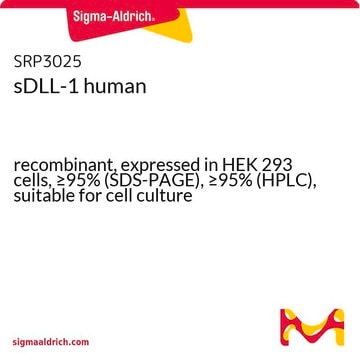SRP8012
Jagged-1 (human): FC (human)
recombinant, expressed in HEK 293 cells, >90% (SDS-PAGE)
Synonym(s):
JAG1, Protein jagged-1, Tweak-receptor, hJ1
About This Item
Recommended Products
biological source
human
recombinant
expressed in HEK 293 cells
Assay
>90% (SDS-PAGE)
form
liquid
mol wt
~150 kDa by SDS-PAGE
packaging
pkg of 10 μg
storage condition
avoid repeated freeze/thaw cycles
concentration
≥0.2 mg/mL
technique(s)
ligand binding assay: suitable
impurities
<0.1 EU/μg endotoxin, tested
suitability
suitable for molecular biology
UniProt accession no.
shipped in
wet ice
storage temp.
−20°C
Gene Information
human ... JAG1(182)
General description
Application
Biochem/physiol Actions
Physical form
Other Notes
Storage Class Code
10 - Combustible liquids
Flash Point(F)
Not applicable
Flash Point(C)
Not applicable
Choose from one of the most recent versions:
Certificates of Analysis (COA)
Don't see the Right Version?
If you require a particular version, you can look up a specific certificate by the Lot or Batch number.
Already Own This Product?
Find documentation for the products that you have recently purchased in the Document Library.
Our team of scientists has experience in all areas of research including Life Science, Material Science, Chemical Synthesis, Chromatography, Analytical and many others.
Contact Technical Service








